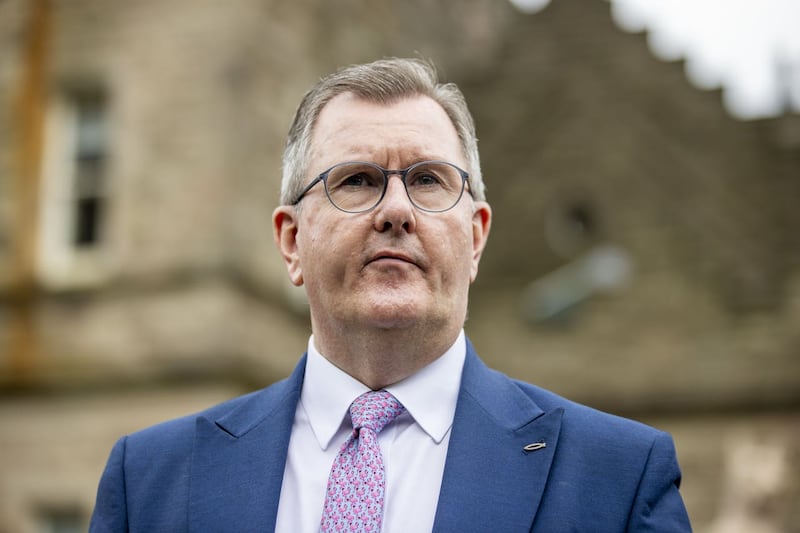The Government has denied its negotiations with the DUP on the post-Brexit Windsor Framework have been concluded.
The statement from the Northern Ireland Office came after Sinn Fein claimed the Government had informed its leadership that the negotiation process was over.
The Sinn Fein assertion came ahead of a meeting with the main Stormont parties and Northern Ireland Secretary Chris Heaton-Harris at Hillsborough Castle on Monday.

The meeting is focused on Stormont’s financial difficulties and what steps can be taken to address the budgetary issues if and when powersharing is restored in Belfast.
However, Sinn Fein said it will use the meeting to call for a date to be set to restore the institutions, as well as urging the Government to deliver an accompanying financial package.
Sinn Fein President Mary Lou McDonald, vice president Michelle O’Neill and former Stormont finance minister Conor Murphy will attend Monday’s discussions.
Speculation has been growing in recent weeks that the DUP could be closing in on an agreement that could restore the Executive and Assembly at Stormont, with Mr Heaton-Harris having recently insisted negotiations were in their “final, final phase”.
Devolved government has not been functioning in Northern Ireland for nearly two years because of the DUP’s ongoing boycott of the institutions in protest against post-Brexit trade agreements.
The DUP has been in negotiation with the Government to secure legislative assurances of Northern Ireland’s economic position in the UK.
A Sinn Fein spokesperson told the PA news agency on Sunday: “The British Government has confirmed to the Sinn Fein leadership that the Windsor Framework negotiation with the DUP is now over, and concluded.”
In response, the NIO issued a swift denial.
“This is totally incorrect. Discussions with the DUP continue.”
DUP leader Sir Jeffrey Donaldson briefed party members at the weekend that people were “getting over-excited” by the announcement of all-party talks, as he maintained that more work remained to be done before a return to Stormont is secured.

In an email to party members seen by the PA news agency, Sir Jeffrey insisted that the roundtable discussion is separate from the DUP’s negotiations with the Government in relation to the restoration of devolution.
In his letter to party members, the DUP leader said “more work” was required before they would return to Stormont.
“Whilst some were getting over-excited by this meeting being called, it is nonetheless a step forward in that the Government seem to be focused on Northern Ireland finances and accepting the case we have been making, for several years, that Northern Ireland is underfunded,” he said.
“Monday’s roundtable is distinct from our discussions with the Government regarding the NI Protocol/Windsor Framework.
“Those talks continue to make progress, but more work is required to conclude that process if we are to have arrangements acceptable to unionists as well as nationalists.”
Sir Jeffrey said he would be attending the talks on Monday alongside party deputy leader Gavin Robinson and finance spokesman Gordon Lyons.
In the absence of an Executive, the budget for Northern Ireland was set by Mr Heaton-Harris and there have been shortfalls of millions across a range of Stormont departments.
The Department of Finance has said that despite cuts of more than £900 million, Northern Ireland is on track for an overspend this year of £450 million.
This rises to nearly £1 billion if accounting for a pay rise for NI public sector workers to match that of the other regions of the UK.
The DUP leader has said that Northern Ireland is being underfunded and that the party delegation will reiterate this to Mr Heaton-Harris on Monday.
Sir Jeffrey added that no amount of increased efficiency would fill the budgetary gap.
“Regardless of when the NI Assembly returns, our allocation from Treasury cannot sit unaltered,” he said.
“Whilst this year we are underfunded by £300 million, by 2025 that gap widens out to £1.2 billion.”
He added: “Of course, as with any administration, there will always be examples of where money could and should be better utilised, but no amount of feasible efficiency could fill the annual shortfall created by the Barnett squeeze.
“We will be clear with the Government on Monday that we need to get a solution with recurring funding that enables us to invest in our schools and hospitals as well as pay our public servants appropriately.”
The Northern Ireland Office has been approached for comment.








